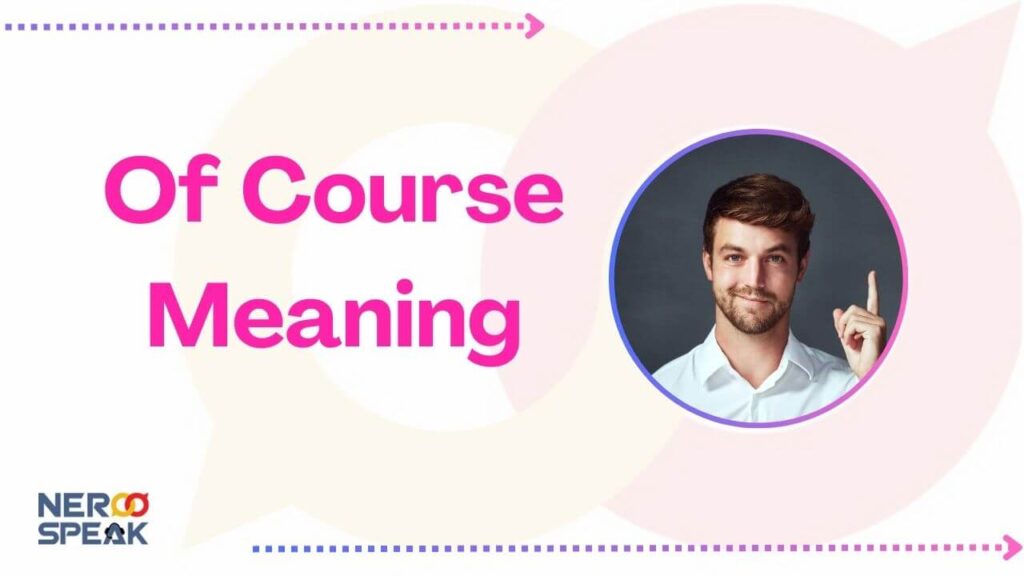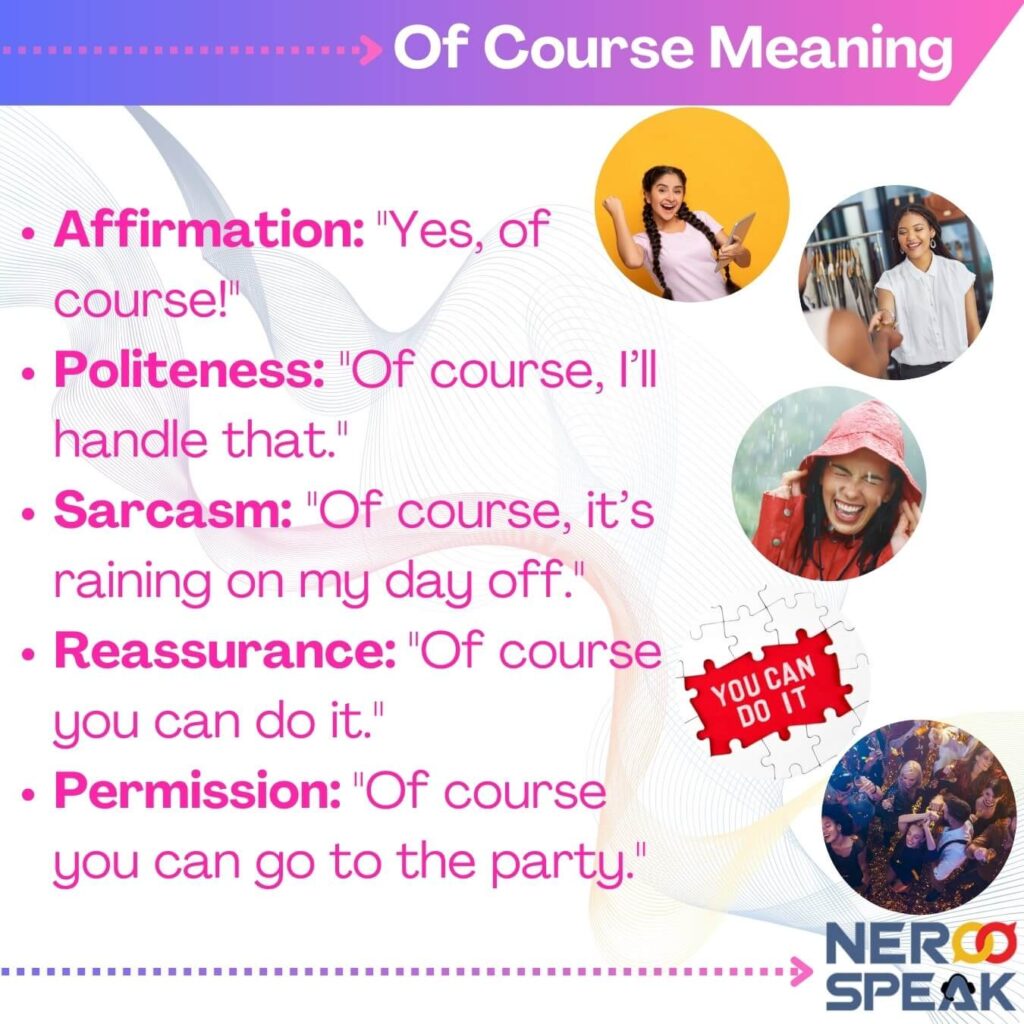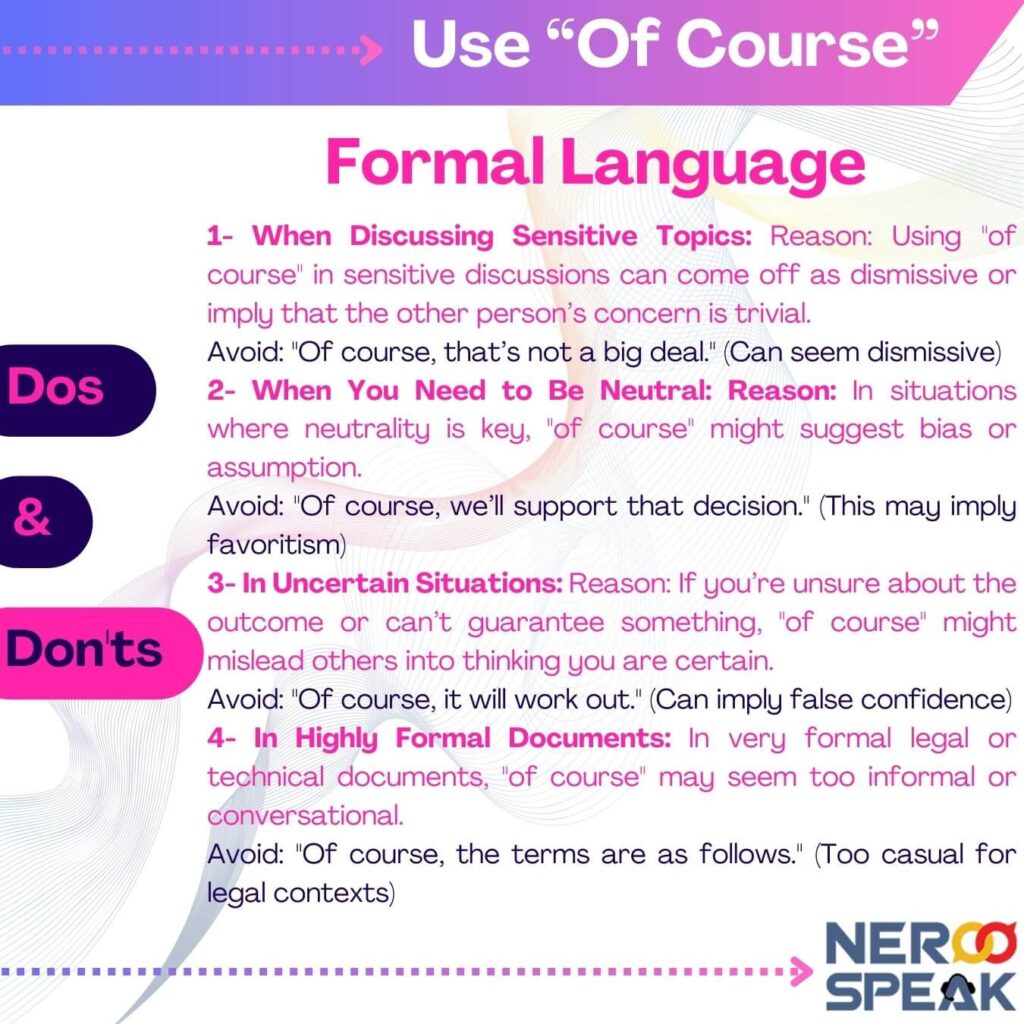It’s just the phrase “of course.” But why is there so much information about it? We will look into why this phrase is important as we read on. So, what does “of course” mean?

Of Course:
The phrase “of course” means that something is clear, expected, or known. It can show agreement, support a statement, or highlight how certain a response is. The tone can change from real to sarcastic depending on the context.
The Evolution of “Of Course”
The phrase “of course” has changed quite a bit over time. A long time ago, it meant something that happens easily or is clear. Now, “of course” is used more in conversations. People often use it to agree, show they are sure, or emphasize something obvious.
It can show honesty, trust, or even playfulness, depending on the situation and tone. This shift in how we use words shows that language can change and adapt to our modern ways of speaking.

“Of Course meaning” in Different Contexts:
Here’s how to use “of course” in different situations. We will see what “of course” means in each one.
- Affirmation: “Of course” means that something is expected or understood. For example, you might say, “Yes, of course!” when someone asks for help.
- Politeness: It can be a kind way to agree with a request. You might say, “Of course, I’ll handle that.”
- Sarcasm: At times, people say it with a sarcastic tone. It can show that something is obvious, like when you say, “Of course, it’s raining on my day off.”
- Reassurance: “Of course” can help make someone feel certain. For example, you could say, “Of course you can do it.”
- Permission: It can also mean you give approval or permission. For instance, you might say, “Of course you can go to the party.”
This flexibility makes “of course” a powerful phrase in English. It can work in many situations and tones.
“Of Course” vs. Similar Phrases
- Naturally: This means something is expected to happen based on common sense or nature. It’s used when the result is clear from the situation. Example: “She was upset when she heard the news.”
- Obviously: This means the facts or information is clear for everyone to see. It can sound rude if not used carefully. Example: “You need to study if you want to pass the exam.”
- Certainly: This shows strong agreement or support. It’s a more formal way to say “yes.” Example: “We can schedule the meeting for next week.”
- Sure: A simple and informal way to agree or confirm something in daily chat. Example: “I’ll pick up the groceries on my way home.”
- Absolutely: Strongly confirms that something is true or will happen, with no doubt. It agrees feel stronger. Example: “We can make that change to the design.”
- Without a Doubt: This shows total certainty about something, leaving no room for questions. Example: “She is the best candidate for the job.”
- Indeed: more formal way to agree with something, often used to highlight a point. Example: “The results were better than expected.”
- Undoubtedly: This stresses that there’s no question about the truth of something. It supports the certainty of a statement. Example: “The team worked very hard to achieve this.”
- No Doubt: This means having confidence in a statement, showing that what is said is true. Example: “This is the best option available.”
- Surely: This means something is likely to be true or happen, though there may be a tiny hint of doubt. Example: “They will arrive on time.”

- As Expected: This means something happened just like we thought it would. For example, “As expected, the project was finished on time.”
- Certainly So: A formal way to agree that something is true. For example, “Certainly so, the proposal has been approved.”
- In Fact: A phrase used to add more details or make a point clearer. It shows what was said is true. For example, “In fact, the situation was more complicated than we first believed.”
- Clearly: This means something is easy to see or understand. It shows how obvious a fact is. For example, “Clearly, the company needs to change its plan.”
- Unquestionably: This means something is so clear that there is no doubt about it. For example, “Unquestionably, this is a key moment for the industry.”
- Evidently: This means something is clear based on what we can see or real facts. For example, “Evidently, the new policy has helped a lot.”
- For Sure: A casual way to confirm that something is true. For example, “I’ll be there for sure, without any doubt.”
When to Use “Of Course”?
Informal Language:
- Casual Conversations: In daily chats with friends, family, or co-workers, “of course” shows you agree or feel comfortable. Example: “Of course, I’ll pick you up after work.”
- Texting and Messaging: When you text or message, “of course” is a quick, friendly way to agree. Example: “Of course, I’m in for dinner tonight!”
- Social Media Comments: In comments or replies, “of course” shows you support or agree with someone’s post. Example: “Of course, you look great in that outfit!”
- Friendly Assurances: Use “of course” to casually let someone know you understand their request and will do it. Example: “Of course, I’ll bring the snacks to the party.”
- Informal Offers: When you offer help or agree to something, saying “of course” makes it feel warmer. Example: “Of course, I can help you move this weekend.”
- Joking or Fun Situations: In light or funny moments, “of course” can make the talk feel cheerful. Example: “Of course, I’m the best cook in the house!”
- Quick Responses: A simple “of course” shows you agree without saying much more. Example: “Of course, you’re right!”
Formal Language:
- Professional Emails: In a work setting, “of course” politely says that something will be done or that the information is clear. Example: “Of course, I’ll have the report ready by tomorrow.”
- Business Meetings: During meetings, “of course” shows agreement or confirms plans in a respectful way. Example: “Of course, we’ll follow up on that action item.”
- Formal Correspondence: In formal letters, “of course” shows polite agreement or a willingness to help. Example: “Of course, we would be happy to give more details.”
- Customer Service: When talking with customers, “of course” assures them that their needs will be met well. Example: “Of course, we’ll process your refund right away.”
- Interviews and Professional Conversations: In interviews or formal talks, “of course” respectfully agrees or acknowledges what the other person says. Example: “Of course, learning new things is important for career growth.”
- Presentations and Public Speaking: When giving a speech, “of course” shows that a point is widely accepted, making things clearer. Example: “Of course, using data helps to make better decisions.”
- Formal Invitations and Responses: When replying to invites, “of course” shows you are happy to accept and join. Example: “Of course, I would be honored to attend the event.”
- Academic Writing: In formal writing, like essays, “of course” shows that something is accepted as true. Example: “Of course, more research is needed to understand the details well.”
- Contract Negotiations: In business talks, “of course” shows agreement with terms in a professional way. Example: “Of course, we can agree to the new timeline.”
- Formal Acknowledgments: Use “of course” to politely recognize someone’s input in a formal setting. Example: “Of course, your feedback is very much appreciated.”


When Not to Use “Of Course”?
1- When discussing touchy subjects, be cautious. Saying “for sure” in these talks can sound like you are not taking them seriously. It could make the other person feel that their worries don’t matter.
Avoid saying, “I know, that’s not a big deal.” It can feel like you are ignoring the issue.
2- When You Need to Be Neutral: Reason: In some cases, it’s important to stay neutral. Saying “of course” might show bias or lead to assumptions.
Avoid saying, “I will support that decision.” This might seem like picking favorites.
3- In Uncertain Situations: Reason: If you’re unsure about what will happen or can’t confirm something, saying “of course” might make others think you feel sure.
Avoid saying, “It will work out.” This may give a false feeling of being sure.
4- In very formal legal or technical papers, “of course” may feel too simple or like common talk.
Avoid: “Certainly, the terms are outlined below.” (More appropriate for legal contexts.)

Some FAQs:
1- When does “Of Course” lead to confusion?
“Of course” can confuse people. This happens when it is used sarcastically or when the meaning is unclear. If the listener has a different background or understanding, it may feel dismissive or confusing.
2- Why do we use “Of Course” and what does it imply?
We use “of course” to show that we agree or feel certain. It means the topic we are discussing is clear or easy to understand. This phrase also shows that the speaker is confident about their words.
3- How does “Of Course” reflect confidence and assurance in communication?
“Of course” shows trust. It means the speaker believes the topic is so clear that there is no need to explain further. It helps the listener feel that the speaker is confident in what they are saying or agreeing to.
4- How it’s used in movies, TV shows, and literature?
In movies, TV shows, and books, “of course” is often used to show that a character has confidence. It can also be used to be funny or to highlight something obvious in the story. Sometimes, it feels ironic, depending on what is happening.
5- How to master the use of “Of Course” in conversations?
To use “of course” well in conversations, watch the situation and tone. You can say it when you feel sure or agree. However, be careful about how others might feel. Try saying it in different ways so you don’t sound mean or rude unless that is your goal.
We hope you had a good read!!
You can also check out our other articles:
- List of 30 Blue Wild Flowers Names
- How Do I Say Goodbye?
- All Emotions List
- Quicker Than A Lambs Shake
- Uncountable Nouns List
- +40 of Water Idioms with Meaning

Ali Mohammad is a SEO Specialist, Content Writer, and WEB Developer with over 4 years of experience in WEB. He has a strong background in Content Writing gained through SEO Companies. He holds a Master Degree in Communications Engineering from Tishreen University and is a certified professional. Ali is passionate about Business and Engineering and enjoys helping readers by sharing his knowledge.